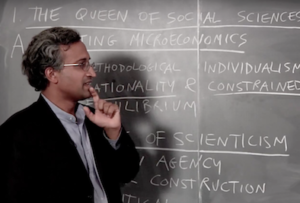In this course, we provide critical exposure to microeconomics as more than a field of applied mathematics. We’ll introduce a domain of unsettled questions and live debates, many fundamental in nature, reflecting the existence of different descriptive and prescriptive views of the world. We make no pretense of providing comprehensive coverage of the standard curriculum, nor indeed of alternative approaches. Rather, we aim for an engaging survey of a wide range of topics, providing students with exposure to some elements of advanced microeconomics for the critical mind. We aim to lay a foundation for graduate students to undertake the related tasks of critique and construction in their subsequent studies and research.
Intended Audience: graduate level economics students
Time to complete the course: 5-6 hours per week
Certificate or digital badge for completing the course: no
Format: self-paced; instructor-moderated
Asynchronous (independent) activities: videos; quizzes; discussions
Synchronous (class) activities: yes
Instructor feedback: no
Peer feedback: no
Group work: no
Prerequisites: Participants should be familiar with undergraduate microeconomics prior to taking this course. A certain level of mathematical proficiency will be assumed, in particular, knowledge of basic mathematical notation and concepts related to sets, functions, matrices, probability, linear algebra, multivariable calculus, and constrained optimization, among other topics. We intend to use as much mathematics as required and not more, especially in the lectures, in which we will attempt to introduce as much interpretative and contextual content as possible.
Recommended Materials: none



